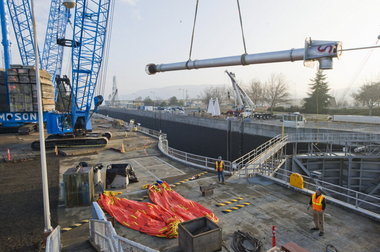forum
library
tutorial
contact

Columbia River Lock Closures Will Have Impact,
But Early Warning Will Help
by StaffThe Oregonian, December 9, 2010
|
the film forum library tutorial contact |

|
Columbia River Lock Closures Will Have Impact,
by Staff |
 Scott Tuthill waited this week in the Columbia River above the John Day Dam for the tugboat he worked on to move a barge loaded with wheat and paper products through the navigation lock.
Scott Tuthill waited this week in the Columbia River above the John Day Dam for the tugboat he worked on to move a barge loaded with wheat and paper products through the navigation lock.
It will be the last time for a while as the lock and two others on the Columbia and Snake rivers shut down today for 14 weeks.
Tuthill, 42, a pilot and deck mechanic, will be temporarily laid off along with about half of Tidewater Barge Lines' 200 workers while the U.S. Army Corps of Engineers replaces the gates at John Day, The Dalles and Lower Monumental dams, shutting down all river traffic.
But Tuthill said most of the workers will be able to navigate the layoff because they had more than a year's notice. "My wife has a job, and I prepared for it well in advance, working overtime and extra days. It's not a problem for me."
The project's long lead time helped ease the impact for workers, wheat growers and other users of the river system that carries 40 million tons of cargo worth about $17 billion each year.
Wheat and other agricultural products flow downriver to Portland for shipment overseas. The Port of Portland is the nation's No. 1 exporter of wheat. Trash from Vancouver, gasoline and diesel fuel travel upriver.
The $45.1 million project is being done now to thread the needle between the fall harvest season and court mandates to barge fish past the dams in April.
"If it was September or October, it would be a different story," said Kristin Meira, government relations director for Pacific Northwest Waterways Association, which represents 100 river users.
The projects also avoid emergency closures.
"If you don't invest in the system, and allow one of these gates to fail, that would equal a one-year closure," Meira said.
The original proposal was to shut down one of the gates every other year, which would have dragged out the process for six years and created more hardship, said Rob Rich, director of administration for Shaver Transportation Co., a barge and tug operator.
"We had two years to position ourselves to be ready for this," Rich said. Under an agreement with the International Organization of Masters, Mates and Pilots union, about a third of the company's 60 employees will have no work, but they will still have their jobs and their health insurance during the closures.
"There will definitely be significant impacts to trade in the Northwest," Meira of the waterways association said. "But the silver lining is that the river-system users have known about the closure for over a year."
Farmers were able to sell grain early or make plans for storage over the winter, she said.
U.S. Wheat Associates, the wheat industry's marketing arm, has worked hard to get the message to buyers in major markets such as Japan, South Korea and the Philippines to purchase U.S. wheat early, Meira said.
Exports are up 25 percent compared with the same period last year, in part because of a Russian export ban, despite the closure, said Glen Squires, vice president of the Washington Grain Commission.
"Our harvest was about two weeks late, and growers were able to actually sell into a rising market," Squires said.
Some growers may hold their grain until after the river reopens.
"There's a lot of pieces coming together," he said. "Who know how it's all going to work?"
The corps of engineers also will be doing some maintenance work on the locks at Bonneville, McNary, Ice Harbor, Little Goose and Lower Granite during the closure.
The interruption of fuel shipments upriver almost certainly will lead to higher fuel prices in eastern Oregon and Washington, as oil companies switch to higher cost transportation options, according to Mark Anderson of the energy emergencies and security program at the Washington Department of Commerce.
However, a glut of fuel in the western half of the two states could lead to lower prices there, Anderson said.
During the winter months, about 147 million gallons of gasoline and diesel fuel are shipped upriver by barge to Pasco, where it is either loaded into a Chevron pipeline for delivery to Spokane or onto tanker trucks for shipment throughout eastern Oregon and Washington.
The Coast Guard estimates an increase of about 1,750 tanker-truck fuel shipments over the closure period, Anderson said.
He said Tidewater planned to stage six barges containing a total of 228,000 barrels near the Pasco terminal.
All the economic disruption aside, Tuthill is looking forward to the closure as an opportunity for a vacation.
The Tidewater employee said he would have enough seniority because of his 18 years with the company to work on the few boats that the company will continue to operate, but he wants to give younger workers the opportunity because they need it more than he does.
"It's not all selfless," he said. "I do want to have a couple months off."
learn more on topics covered in the film
see the video
read the script
learn the songs
discussion forum
